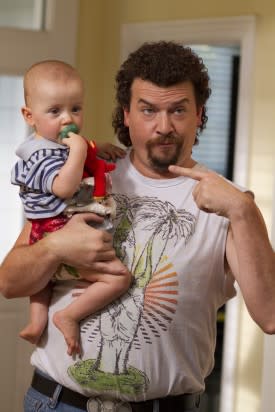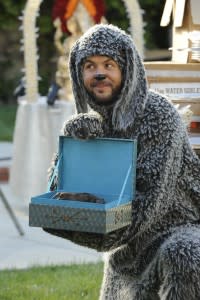EMMYS: Are Some Shows Too Raunchy?
Adam Buckman is a contributor to AwardsLine.
Viewers have embraced a certain degree of raunch in their TV comedies, but the Emmys have not quite caught up with them.
Though there have been exceptions in recent years – with nominations and scattered awards going to some of TV’s more adult-oriented comedy series, such as Curb Your Enthusiasm or Nurse Jackie – the lion’s share of Emmy attention continues to be paid to mainstream comedies on broadcast television, even though some of them, too, have pushed the content envelope in recent seasons.
Producers of some of TV’s raunchier comedies say they’d love Emmy recognition, but they’re not holding their breath. “I think it would be a huge honor obviously to have that sort of recognition,” says Danny McBride, co-creator, executive producer and star of the decidedly off-color Eastbound & Down on HBO. “Eastbound & Down is of a very crude nature, and the comic sensibility is dark. I don’t think you really see shows of that nature awarded in that way,” he said.
In the series, McBride plays a tactless, foul-mouthed former pro baseball player who offends everyone he encounters. Nevertheless, as in past seasons, Eastbound & Down is being submitted for Emmy consideration.
But McBride may have a point about where the Emmy emphasis usually goes. Sitcoms on the traditional broadcast networks – shows such as Modern Family (ABC), 30 Rock (NBC) and Everybody Loves Raymond (CBS) – have won the best comedy Emmy every year since 2001, the year HBO’s Sex and the City won the top comedy award and became a notable exception for cable TV. The network sitcoms also dominate in the acting categories with top honors there going to the likes of Jim Parsons for The Big Bang Theory (CBS) for the last two years and, before him, two consecutive wins for Alec Baldwin of 30 Rock. The top comedy actress award has been slightly more generous to cable comedy, with Edie Falco of Nurse Jackie and Toni Collette of The United States of Tara – both on Showtime and two of TV’s more permissive comedies – winning best actress Emmys (in 2010 and 2009, respectively).
And while cable comedies such as Curb Your Enthusiasm and Entourage on HBO and comedian Louis CK’s Louie on FX have received nominations in various categories in recent years, Emmy wins have been scarce for the cable coms (with the notable exception of Jeremy Piven’s multiple wins as best supporting actor for Entourage).
Whether or not the cable comedies suffer at Emmy time because their four-letter words and adult subjects are a turn-off to voters remains an open question, especially since the comedies on the broadcast networks – from the The Big Bang Theory to Two and a Half Men (CBS) – often traffic in similar material. One new sitcom that’s being submitted for Emmy consideration this year even has the word “bitch” in its title. And though the word isn’t spelled out in the title for ABC’s Don’t Trust the B—- in Apartment 23, the title, and the show itself, might not appeal to Emmy voters, the show’s creator, Nahnatchka Khan, acknowledges. “It could potentially be an issue for some people,” Khan concedes. “Maybe they won’t give it a chance because they are offended by the word ‘bitch.’ ”
Other than possessing a potentially offensive word in its title, and some sexual content in the show itself, Don’t Trust the B—- is in every other respect a traditional broadcast TV sitcom.
But these days, TV comedy comes in a variety of forms and styles. So-called traditional sitcoms with 22-episode seasons – and filmed with either one camera (such as the docu-styled Modern Family, The Office or Don’t Trust the B—–) or three (such as The Big Bang Theory, 2 Broke Girls and many others) – are one thing. The comedies on more-permissive basic cable and anything-goes pay cable are pushing the envelope not only with their subject matter, but with the very style in which they are produced. Just about the only thing some of the cable comedies have in common with the traditional sitcoms is their half-hour length.
“We’re in a category with a lot of shows that tend to ‘reset’ each week,” notes Eastbound & Down co-creator Jody Hill. “And we do a comedy show that’s essentially structured like a giant movie, and here’s a character that you kind of have to follow along each week,” he said of the ex-ballplayer McBride plays on the show.
The showrunner on one basic-cable comedy is at pains to even categorize his show, which tells the story of a man (Elijah Wood) who believes his neighbor’s dog talks to him. The scenario of the show – Wilfred on FX – requires that one of the show’s lead characters be played by a man (Jason Gann) in a dog costume. And inevitably, the “dog” is a rough-around-the-edges personality who, because he’s a dog, talks clinically and candidly about a variety of bodily functions, from the sexual to the excretory.
“We call it a situation-psychodramedy,” showrunner David Zuckerman said, “because we have some fairly deep and complex stories, but we also have a guy in a dog suit doing crazy things.”
Zuckerman said he hopes the voters considering Wilfred for Emmys will overlook the show’s more pungent subject matter in favor of focusing on the craft involved in making its scenario credible. “If our show wasn’t lit and shot properly, it would be easy to dismiss the show,” he said. “We have a guy in a dog suit,” he noted. “It could have looked like ALF.”
Related stories
EMMYS: Mike Fleming’s Q&A With ‘Boardwalk Empire’ Creator Terence Winter
Get more from Deadline.com: Follow us on Twitter, Facebook, Newsletter



